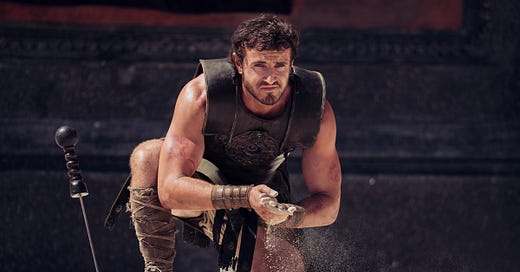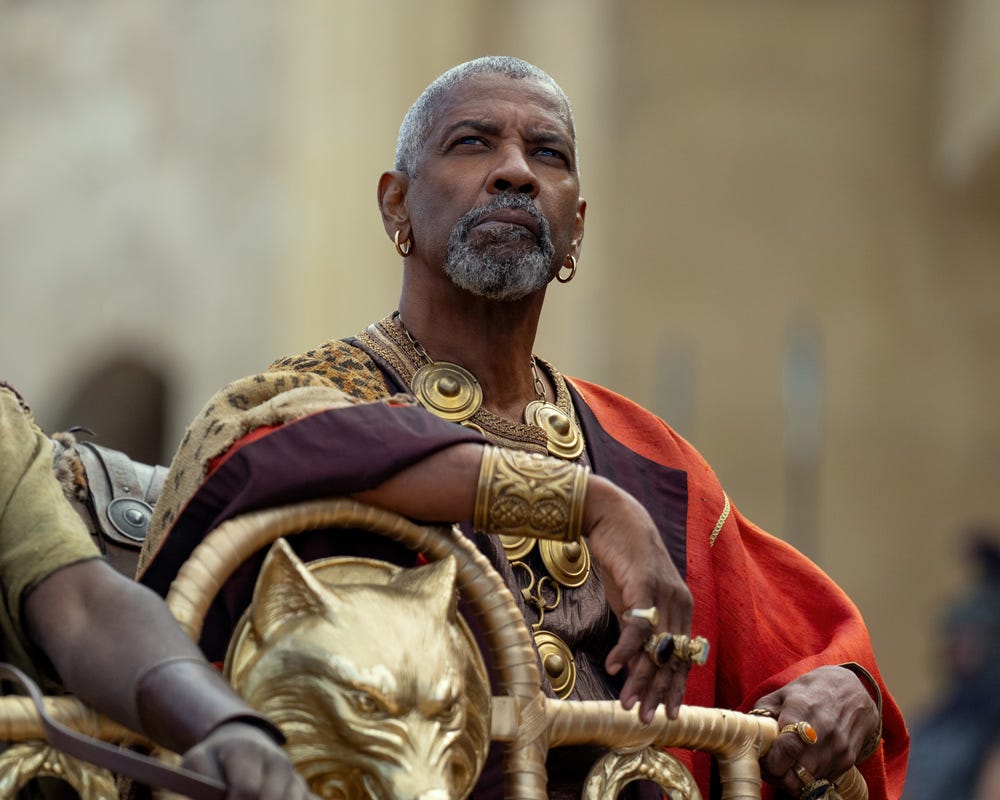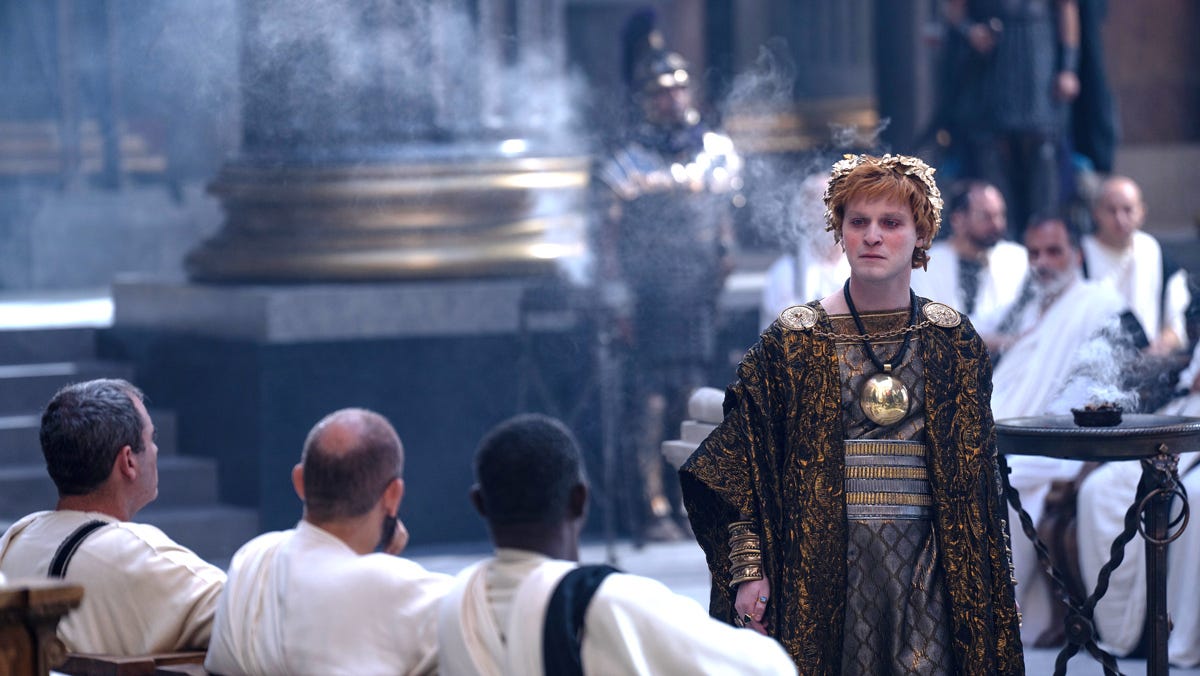'Gladiator II' Is A Himbo Movie: Kinda Stupid, But So Beautiful It Doesn't Matter
Ridley Scott's sequel is a lot like watching actual gladiatorial combat: morally suspect but undeniably thrilling.
Welcome to The #Content Report, a newsletter by Vince Mancini. I’ve been writing about movies, culture, and food since I started FilmDrunk in 2007. Now I’m delivering it straight to you, with none of the autoplay videos, takeover ads, or chumboxes of the ad-ruined internet. Support my work and help me bring back the cool internet by subscribing, sharing, commenting, and keeping it real.
Brief Plugs
- Pod Yourself A Gun, our acclaimed Sopranos (and then The Wire) rewatch podcast is back, with a new season: Mad Yourself A Man. Get every episode early and ad-free by subscribing here. $8 tier gets you a shout out.
- The Frotcast, our sorta-movies podcast, is still new every week. This week we talked Tyson-Paul, Elon as Trump’s “first buddy,” and Challengers. A subscription gets you every Frotcast ad-free, plus Pod Yourself A Gun, Pod Yourself The Wire, and Mad Yourself A Man too. Right here.
Okay, onto the review…
—
At least for the first two hours, Gladiator II is a wonder — a monument to the power of pure spectacle that manages to surpass both the original and virtually every other attempt to recreate it in between, all directed by a guy who turns 87 this month. Narratively speaking, it collapses almost entirely in the last third, losing any ideological coherence it had, and yet even in its dying gasps, still delivers enough gorgeous gore that I found myself trying to stifle gleeful giggles like I was stoned at a funeral.
Gladiator II is far more an unintentional metaphor for the fall of Rome than it is the testament to Roman ideals that it seems to want to be. Certainly there are worse things to be. Even when Gladiator II is stupid and bordering on fascist apologia, it’s still a SPECTACLE OF GLORIOUS OWNAGE. I watched it like an actual Roman might have watched actual gladiators: knowing deep down that it was morally indefensible, but fully geeked on bloodlust and ghoulish fascination nonetheless.
It’s hard not to compare Gladiator II with its predecessor of 24 years ago, and the sequel bends over backward to incite such a comparison anyway, starting with a stylized animated opening credits sequence that painstakingly recaps the events of the previous film. (The sequence also renders the title as “GladIIator,” which I’d like to think was Ridley Scott’s title of choice before the studio overruled him, BlacKkKLansman style).
Gladiator was a fun movie with an appealing star — a straightforward revenge story about a deposed Roman general regaining his status through his mastery of the arena. In some ways it functioned as a defense of the meritocracy, a story in which Maximus was stripped of all his laurels and the trappings of his well-born status and sold into anonymity, but still managed to claw and stab his way back through guile, force of will, and the proper applications of both ruthlessness and mercy (not to mention some good politicking, or winning the crowd, in gladiatorial terms). Eventually he avenges his wife by killing Commodus, the malformed, undeserving and debauched nepo baby usurper who had originally wronged him. Maximus dies in the process, but as we know, “what we do in life echoes in eternity.”
Even Ralphie Ciffaretto from The Sopranos loved that line, and Gladiator was a perfect tentpole — with enough sword-and-sandals appeal to please the cinephiles (I vividly remember my French New Wave film studies professor bellowing “Men in skirts!”), with plenty of epic-sounding trailer lines memorable enough that even dumbasses like Ralphie could quote without butchering too badly. Big, bold, slightly corny and unabashedly romantic, Gladiator was the beau ideal of “movie magic.”
After opening with one of Ridley Scott’s all-time greatest set pieces (“At my signal… unleash hell,”) during which Maximus bombards an army of rebellious, bloodthirsty Germanic barbarians with incendiary projectiles (not especially historically accurate, but undeniably dramatic), Gladiator’s action scenes were arguably its weakest element. A lot of the worst quick cut/shaky camera tendencies of the ensuing decade of action cinema can be traced back to Gladiator, which took the grainy, high-speed film look and bouncy camera of Saving Private Ryan (1998) and added jumpy editing, with lots more cuts, often away from the action.
Gladiator II does away with all the attitude editing, applies the insane spectacle of the Unleash Hell sequence to almost every scene, and adds in matter-of-fact gore. It is, quite frankly, one of the most visually enjoyable films I’ve ever seen. If you enjoyed Gladiator’s tigers, you’ll love Gladiator II’s rabid baboons (apparently inspired by a parking lot incident Scott witnessed in South Africa). It also has charging battle rhinos and a naval battle staged in a flooded gladitorial arena filled with hungry sharks. Fuuuuuuuuuuuuuuuck yessssssssss. Ridley Scott built a cabin on the line between stupid and cool and lived there full-time.
Oh right, the plot. Paul Mescal plays Hanno, an adopted son of Numidia whose mentor (played by Peter Mensah) praises him for “absorbing all of the ways of your new home.” In the first scene, Hanno leads an unsuccessful defense of his Novo African kingdom from an attacking Roman naval fleet led by Marcus Acacius, played by Pedro Pascal. You can guess what happens next: the Romans win, kill Hanno’s wife (Yuval Gonen) in the process, and Hanno gets sold into gladiatorial servitude, dreaming of his dead wife and vowing revenge against Marcus Acacius.
So far it sounds a lot like the plot of Gladiator. With one key difference: whereas Maximus was a born-and-raised son of the empire (betrayed by Commodus because he was so close to the Emperor), Hanno seems to belong to a long tradition of western protagonists who have “gone native” — from Kevin Costner in Dances with Wolves to Jake Sully in Avatar. Hanno has adopted Numidian ways, served a Numidian father, and married a Numidian wife, basically despising Rome and everything it stands for. It’s not particularly important to know where Numidia is, the point is that Hanno is a casualty of empire rather than an agent of it. However conflicted about his role Maximums may have been, that’s an important distinction, and for a lot of GladIIator’s run time, it gives the film some added dramatic heft.
Hanno isn’t just fighting to restore the Glory of Rome and his proper place in society, he knows that the “Glory of Rome” is an oppressor’s fairytale. He’s mentored in this, or so it seems at first, by his owner/promoter, Macrinus (Denzel Washington) a wiley ex-Gladiator turned high-society mover-and-shaker. Big Mac watches Hanno fight off a rabid baboon and buys him immediately, praising Hanno’s “bottomless rage.” “Cherish your anger,” Macrinus advises Hanno. “It will carry you wherever you want to go.”
(A Red Ass of Courage, I’d like to think it’s called, when you get so pissed you murder a baboon in self defense).
I probably don’t need to tell you that Denzel chews and savors every solitary morsel of his dialogue and looks like he was positively born to wear pinky rings and gold leaf togas. Actors like Oliver Reed (whose role Washington is basically taking over here) and Russell Crowe are big shoes to fill, but with Washington and Mescal in the two main roles, plus Pedro Pascal, Connie Nielsen returning as Lucilla, and Joseph Quinn and Fred Hechinger as the two new debauched co-Emperors, I’d have to say that the sequel actually surpasses the original for net acting talent. Fred Hechinger (Thelma, White Lotus…), here playing a syphilitic fail child whose best friend is a monkey, has nearly completed his Barry Keoghan speed run on his way to becoming America’s National Rascal. Kid’s had a hell of a run lately.
Anyway, Hanno’s hatred of all things Roman could’ve easily been another improvement over the original. And for a lot of Gladiator II’s run time, it is. Hanno doesn’t just have the circus master as his enemy and the Gladitorial arena as a venue for winning hearts and minds; he can hate the whole thing — the entire society, from the debauched emperors to the corrupt slave masters right down to the bloodthirsty Colisseum punters, braying at the chance to see him torn apart by slavering monkeys or gored through by rumbling rhinoceri. There’s a power and a purity to him wanting to burn it all down. And it seems justified.
Maximus and the dying Marcus Aurelius shared a dream of the Roman Republic, and a fear of the Roman Empire (which Aurelius, like Dwight Eisenhower in his military-industrial complex speech, managed to identify only on his way out after spending his entire career building it up). Why would a child of the provinces and a victim of Roman aggression like Hanno dream of that Republic?
Gladiator II sadly has an answer to this question.






